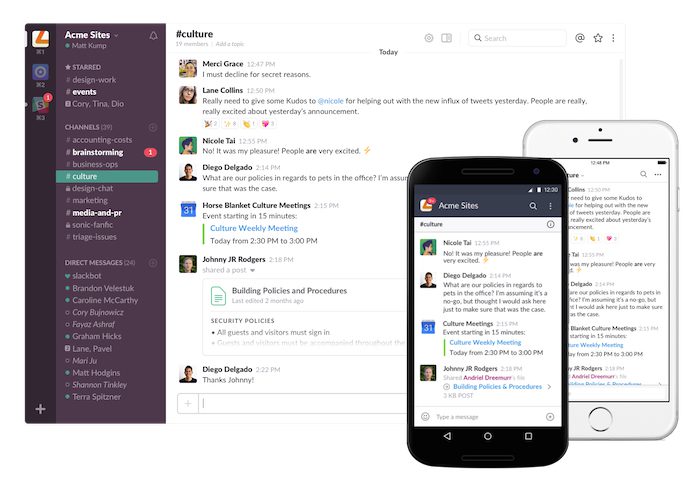
But have we reached peak Slack? On Monday, Vice’s Motherboard said it was disabling Slack for this entire week. The tech site has contributors globally and it sends more than 5,000 messages weekly across its eight Slack channels.
Best thing about no Slack is not having to hear my US colleagues whine about the NY office toilets/coffee/heating https://t.co/rUr7RQmOUC
— Vicki Turk (@VickiTurk) May 16, 2016
I wonder how many Slack channels this is being posted in rn: Why @motherboard is Taking a Break from Slack https://t.co/JGYEkmnk45
— Man Bartlett (@ManBartlett) May 16, 2016
In a post, Motherboard managing editor Adrianne Jeffries explained why the site was taking a break:
Slack has been an indispensable tool. However, we noticed that more and more time was being diverted to Slack. It wasn’t just joking around, although there was plenty of that. We’d find ourselves spending 30 minutes in a spirited debate about a story we all seemed interested in, but then… no one would write something for the site. It was as if the Slack discussion had replaced the blogging process. Talking about a topic with our colleagues fulfilled the urge to publish.
The other recurring issue with Slack is that it’s just baseline distracting. People are always talking, often directly to you, and they usually expect an immediate response. Writers and editors need unbroken blocks of time to work. Slack makes that difficult.
Jeffries wrote that she hopes the experiment will “will give reporters a chance to refocus on writing stories and encourage more in-depth conversations with editors.” After this week, Motherboard will evaluate whether cutting Slack made a difference and then determine the best way to proceed.
Slack has certainly changed the way publications work. Most of the Lab staff, for example, is based in Cambridge, Massachusetts, and Slack allows us to seamlessly communicate with our colleague in Chicago. (Hi, Ricardo!)
On Twitter, though, many people were sharing Motherboard’s announcement and agreeing with the site’s reasoning: Slack is frequently distracting and the instantaneous nature of the platform can encourage users to spend too much time talking in various channels instead of, you know, doing actual work. (For the record, I’ve interrupted writing this at least 10 times to check various ongoing Slack discussions.)
I woke up 30 minutes ago and have already made coffee, eaten breakfast, and edited a story all thanks to the Unslack
— ᴅᴇʀᴇᴋ ᴍᴇᴀᴅ (@derektmead) May 16, 2016
Saying that Slack represents the end of email ignores the fact that communication should never be completely frictionless.
— Mimsy McMimsface (@mims) May 16, 2016
Slack is great, but @adrjeffries is right: it can easily become a convincing simulacrum of actual work. https://t.co/669sOYlz0u
— Kevin Roose (@kevinroose) May 16, 2016
Still, others questioned Motherboard’s decision:
yet another "slack is bad" take that is really "our office culture is normal but let's freak out over it" https://t.co/yXmgsAblpZ
— Harry Pavlidis (@harrypav) May 16, 2016
Before anyone outside of the Twitter-tech-media echo chamber has heard of it, Slack is peaking. https://t.co/ilzqrmA4pE
— katie rosman (@katierosman) May 16, 2016
Motherboard cuts Slack bc they talked stories then never wrote up.
Not sure tool is to blamehttps://t.co/0jD1ez4f68 pic.twitter.com/19HJl9ve1v— Jillian Sederholm (@JillianSed) May 16, 2016
is taking a break from slack the new leaving twitter https://t.co/TBB6Tp3ycD
— Sara Morrison (@SaraMorrison) May 16, 2016